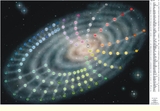I love the periodic table of elements and thought I was alone in my appreciation. I kept the secret close to me right into adulthood where I received quite a shock. It turns out I’m not alone and many, many others are just interested, if not downright obsessed.
In her Feb. 7, 2012 posting for the Guardian Science blogs, GrrlScientist profiles a new book about the periodic table of elements (The Periodic Table: A Very Short Introduction by University of California at Los Angeles lecturer and writer Eric Scerri). From the posting,
… we are introduced to an interesting cast of international characters, including physicists, chemists, geologists, teachers, tradesmen and nobleman, all who played a role in the discovery and evolution of the periodic table. Notably, we meet Scottish physician, William Prout, whose proposal that all matter was composed of hydrogen atoms motivated the scientists of the day to obtain ever more accurate weights for each atom in their quest to prove whether his hypothesis was correct. We meet Danish-American eccentric, Gustavus Hinrichs, who saw the connection between the frequencies of spectra emitted by the elements and the internal structures of their atoms. We also meet German physical chemist, Julius Lothar Meyer, who is considered by some historians to be the co-discoverer of the periodic table, along with the Russian scientist, Dimitri Mendeleev, who sketched out his periodic table on the back of an invitation to a local cheese factory.
This isn’t the only recent book about the periodic table of elements. Sam Kean’s The Disappearing Spoon: And Other True Tales of Madness, Love, and the History of the World From the Periodic Table of the Elements published in 2010 was mentioned in my July 15, 2010 posting. In that posting I also mentioned and rhapsodized about a visual reworking of the periodic table of elements by Philip Stewart into something he called The Chemical Galaxy.
I see you can now purchase the poster through The Chemical Galaxy store but you can also order it from the Science Mall. At the time I purchased the poster, the Science Mall was the only option for someone in North America and I had a very good experience with them. Here’s what the poster looks like,
Unfortunately, this image is too small to offer much detail but The Chemical Galaxy website does offer a larger version. Unfortunately, it doesn’t quite convey the sheer gorgeousness of Stewart’s visualization.
For those who prefer a more musical approach, here’s Daniel Radcliffe (of Harry Potter fame) singing ‘The Elements’ song (originally written and performed by Tom Lehrer)
I look forward to reading the new book once I shoehorn it into my schedule. Who knows? Maybe I’ll finally write that suite of poems based on the elements in the periodic table.
